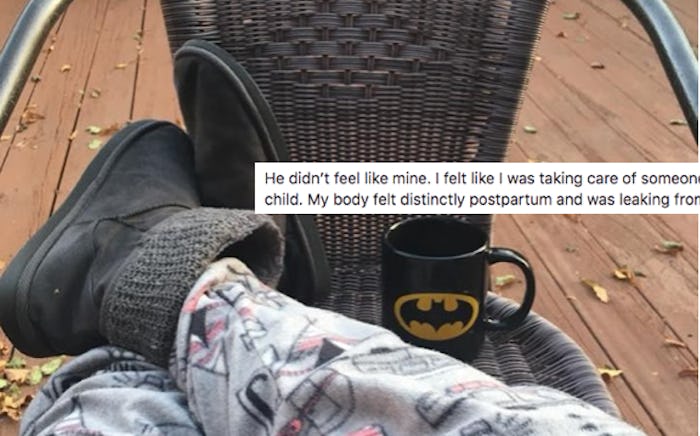While the conversation surrounding postpartum depression has opened up in recent years, there are still aspects of the condition that remain something of a secret. Many people think of general feelings of sadness, but this mom's viral post about how she struggled with postpartum depression for three years shows that it's not a one-size-fits all diagnosis. An important part of breaking down the stigma that still surrounds the condition is open and honest dialogues about its symptoms, because PPD experiences come in many forms.
Mother of three and published author Bunmi Laditan took to Facebook this weekend to share her experience with PPD and has since touched many moms with her story. Early Saturday morning she opened her post by saying, "Let's talk about postpartum depression." From there, she went on to explain what PPD felt like for her, namely a disconnect from her baby:
I had it bad with my third born. My last baby, my first son. We all know about the anxiety, OCD, chilling thoughts, rage that sneaks up on you like a flash fire and then is drowned by your own shame-filled tears and all that fun stuff yay but what no one can prepare you for is how it feels to hold a baby and not feel like she’s yours.
She said that in the early days after her son's arrival, she felt like "something was missing." Unlike with her first two children, she wrote that she didn't have that instant connection:
He didn’t feel like mine. I felt like I was taking care of someone’s else’s child. My body felt distinctly postpartum and was leaking from too many places but as I’d change his diapers and gently push his sweet little arms through his yellow and white pajamas, I remember looking my bedroom door, half expecting his real mother to walk in and say, “Excellent work, fräulein, I’ll take it from here.”
These feelings lingered for longer than Laditan expected, proving that there is no concrete or exact timeline for PPD. She explained in her post that by "showing up" day after day for her child, the divide between them lessened:
Three years. Three years. In that time, I loved my baby boy, took him to play centres, parks, we cuddled, I painted his hands and pushed them into soft clay for keepsakes, and snapped a million photos, but there was a valley between us that I prayed he didn’t feel. Then one day, or perhaps over several days, or maybe through each day of showing up, his real mother finally walked through the door and it was me. 100% me.
Since then, Laditan wrote that she can "confidently" discipline her boy and delight over his mischievous personality. She said that she savors the moments with him, knowing that they are "all hers." She closes her post by urging mothers experiencing what she did to not give up, and to give themselves time:
So, mother, if you’re going through this today, changing a baby’s diaper or giving a toddler a bath with the shaking fear in your heart that this little one will never feel like your own, please just wait. Keep showing up ... One day it will be full and you’ll walk across it to find you were always there somehow. No, it’s not fair that you have to work at what’s supposed to come naturally, but in life the only thing that’s promised is work. Have faith, sweet mother. Your efforts will be rewarded. Speak gently to yourself. Breathe. Ask for help. Dawn will come, girlie. Just stay.
Commenters praised the post's candid nature and shared their own experiences with delayed connecting, explaining the shame that often comes with it. "More people need to talk about delayed connecting ... Everyone needs to know it’s ok not to be instantly connected," one reader commented.
Laditan's story details one of the less often discussed symptoms of PPD, but it is important to remember that no symptom is inherently wrong or abnormal. PPD manifests itself in a variety of ways. Postpartum Progress, a blog dedicated to maternal mental health, lists a variety of symptoms aside from feelings of sadness. They include guilt, feeling overwhelmed, fear and confusion, anger and irritation, emotional numbness, hopelessness, suicidal thoughts, and more. Moms with PPD can experience any combination of these symptoms.
As Laditan shows in her post, there is no set timeline for PPD and duration often depends on how soon women are diagnosed and treated. The Mayo Clinic states on its website on the topic that when left untreated, PPD can last for many months, or — as in Laditan's case — much longer.
In fact, according to Medical News Today, a 2014 study found that 50 percent of women who were receiving medical care for their PPD experienced depression for more than one year after childbirth, and 30 percent of women who were not receiving treatment for PPD were depressed up to three years after giving birth.
Roughly 15 percent of new mothers will experience PPD in their lifetime, according to the American Pregnancy Association. If you think you may be experiencing PPD symptoms or you just want to talk, it's important to reach out to those around you and get help. And, as Laditan urges, don't give up — on yourself or your little one. You will get through this.
Watch Romper's new video series, Romper's Doula Diaries:
Check out the entire Romper's Doula Diaries series and other videos on Facebook and the Bustle app across Apple TV, Roku, and Amazon Fire TV.
